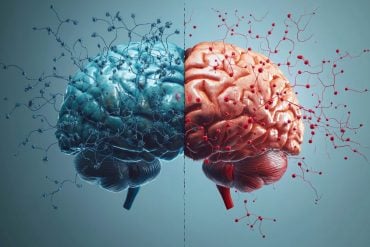Summary: According to researchers, those with sadistic tenancies, who enjoy seeing people suffer, are more likely to seek revenge against those they believe have wronged them.
Source: VCU.
People who enjoy hurting others and seeing them in pain are more likely to seek revenge against those who have wronged them, according to a new study led by a Virginia Commonwealth University psychology professor.
The study, “Personality Correlates of Revenge-Seeking: Multidimensional Links to Physical Aggression, Impulsivity, and Aggressive Pleasure,” found that sadism is the dominant personality trait that explains why certain people are more likely than others to seek vengeance.
“We wanted to paint a picture of the personality of the type of person who seeks revenge. We’re all slighted in our daily lives, but some of us seek revenge and some of us do not. So what kind of person is the person who seeks vengeance?” said David Chester, Ph.D., an assistant professor in the Department of Psychology in the College of Humanities and Sciences at VCU. “The core of what we found is that the person who seeks revenge is a person who tends to enjoy it.”
The study, which will appear in a forthcoming edition of the journal Aggressive Behavior, was conducted by Chester and C. Nathan DeWall, Ph.D., a professor of psychology at the University of Kentucky.
The researchers conducted three studies involving 673 students at the University of Kentucky in which participants filled out questionnaires that have been validated to predict a person’s real-life behavior. They were asked to say whether they agree or disagree to a variety of statements, such as “Anyone who provokes me deserves the punishment that I give” and “If I’m wronged, I can’t live with myself until I revenge.”
“A lot of people don’t want to admit to having certain traits or tendencies that aren’t really savory or socially acceptable, so you have to ask questions in a very specific way,” Chester said. “You’re not asking outright, ‘Are you a vengeful person?’ No one would say that they are. But instead you can use a little bit of subterfuge and get some insight.”
By gaining a deeper understanding of what drives certain people to seek revenge, researchers will be able to create profiles that could be used to identify those who are most likely to commit violence in the future and intervene.
“Not everyone when they’re wronged goes out and shoots up a school. Not everyone when they’re wronged starts a bar fight. But some people do. So identifying who is most at risk for seeking revenge is really important to do in order to intervene before they engage in harmful acts and start to hurt other people in retaliation,” Chester said.
“This type of information [revealed in the study] can be used to build a profile of the type of person to look out for,” he said. “If you know which individuals are most at risk of seeking vengeance against others, maybe you could intervene beforehand and prevent the acts of violence from ever happening in the first place.”

Chester, a leading scholar in the field of aggression research, runs the Social Psychology and Neuroscience Lab in VCU’s Department of Psychology, which aims to further our understanding of violent behavior, exploring the role of the brain and human psychology behind topics such as revenge, domestic abuse, psychopaths and related topics.
“Our real world goal is to reduce violence and to reduce aggressive behavior. The most common form of that is revenge,” Chester said. “When you ask murderers and terrorists and others who commit violence why they did what they did, the answer is frequently that they were seeking retribution for something that someone had done to them.”
“So if we’re trying to reduce aggression, we should start by trying to reduce revenge,” he said. “And one of the best ways to reduce revenge is to figure out who is most likely to do it.”
Source: Brian McNeill – VCU
Publisher: Organized by NeuroscienceNews.com.
Image Source: NeuroscienceNews.com image is credited to VCU.
Original Research: Full open access research for “Personality Correlates of Revenge-Seeking: Multidimensional Links to Physical Aggression, Impulsivity, and Aggressive Pleasure” by David Chester and C. Nathan DeWall in Aggressive Behavior. Published online November 16 2017 doi:10.17605/OSF.IO/4W95M
[cbtabs][cbtab title=”MLA”]VCU “Sadism Leads Certain People to Seek Vengeance, Study Finds.” NeuroscienceNews. NeuroscienceNews, 30 November 2017.
<https://neurosciencenews.com/vengence-sadism-8077/>.[/cbtab][cbtab title=”APA”]VCU (2017, November 30). Sadism Leads Certain People to Seek Vengeance, Study Finds. NeuroscienceNews. Retrieved November 30, 2017 from https://neurosciencenews.com/vengence-sadism-8077/[/cbtab][cbtab title=”Chicago”]VCU “Sadism Leads Certain People to Seek Vengeance, Study Finds.” https://neurosciencenews.com/vengence-sadism-8077/ (accessed November 30, 2017).[/cbtab][/cbtabs]
Abstract
Personality Correlates of Revenge-Seeking: Multidimensional Links to Physical Aggression, Impulsivity, and Aggressive Pleasure
People differ in how much they seek retribution for interpersonal insults, slights, rejections, and other antagonistic actions. Identifying individuals who are most prone towards such revenge-seeking is a theoretically-informative and potentially violence-reducing endeavor. However, we have yet to understand the extent to which revenge-seeking individuals exhibit specific features of aggressiveness, impulsivity, and what motivates their hunt for retribution. Toward this end, we conducted three studies (total N = 673), in which revenge-seeking was measured alongside these other constructs. Analyses repeatedly demonstrated that revenge-seeking was associated with greater physical (but not verbal) aggressiveness, anger, and hostility. Revenge-seeking’s link to physical aggression was partially accounted for by sadistic impulses toward enjoying aggression and the tendency to use aggression to improve mood. Dominance analyses revealed that such sadistic impulses explained the most variance in revenge-seeking. Revenge-seeking was associated with greater impulsive responses to negative and positive affect, as well as greater premeditation of behavior. These findings paint a picture of revenge-seekers as physically aggressive curators of anger, whose retributive acts are performed with planned malice and motivated by the act’s entertaining and therapeutic qualities.
“Personality Correlates of Revenge-Seeking: Multidimensional Links to Physical Aggression, Impulsivity, and Aggressive Pleasure” by David Chester and C. Nathan DeWall in Aggressive Behavior. Published online November 16 2017 doi:10.17605/OSF.IO/4W95M







